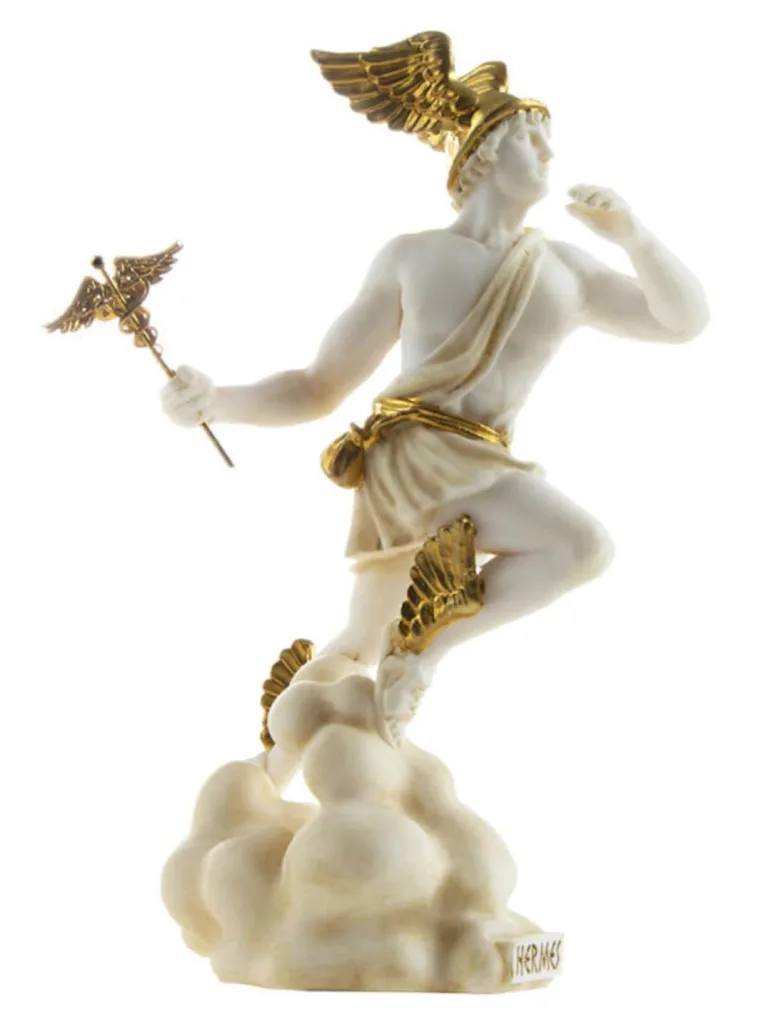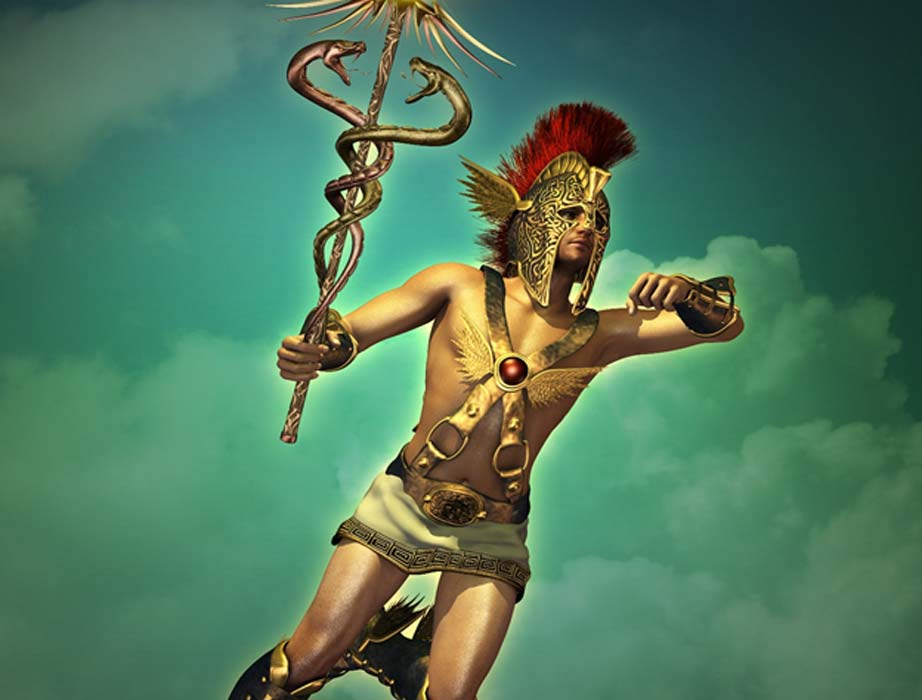Hermes, also known as Mercury in ancient Roman religion, holds a significant role in Greek mythology as the messenger of the gods. With his winged sandals and cap, Hermes is often depicted as a youthful and agile figure, embodying swiftness and grace. However, his role goes beyond mere communication; he is also a protector of livestock and travelers.
In Greek religion, Hermes is associated with various symbols, the most notable being the caduceus. This staff, intertwined with two snakes, represents his divine authority and is often used as a symbol of medicine and healing. In fact, Hermes is often linked to Apollo, the god of medicine, as the two deities work together in providing aid and warding off evil.
As a trickster god, Hermes is known for his mischievous nature. In fact, he demonstrated his cunning from the very first day of his life. As a newborn, Hermes invented the lyre and managed to steal Apollo’s cattle, showcasing his resourcefulness and quick thinking.
Hermes’ divine responsibilities extend to multiple domains. He is the god of roads, guiding travelers on their journeys and ensuring their safe passage. Additionally, he is associated with flocks, protecting and overseeing the well-being of livestock. His influence also extends to commerce, where he brings prosperity and good fortune to traders and merchants.
Another important figure in Greek mythology associated with communication and messages is Iris. She is the personification of the rainbow and serves as a messenger to the Olympian gods, particularly Queen Hera. As a daughter of Thaumas and Electra, Iris plays a crucial role in delivering divine messages and carrying out her duties with grace and elegance.
Hermes is a multifaceted deity in Greek mythology. As the messenger of the gods, he not only facilitates communication among the Olympians but also protects travelers, livestock, and promotes commerce. His quick wit and cunning nature make him a beloved and respected figure in Greek religion. Additionally, Iris, the personification of the rainbow, serves as a messenger to the gods, particularly to Queen Hera. Together, Hermes and Iris ensure that messages are delivered swiftly and efficiently in the realm of the gods.
Who Is The Messenger God Roman?
The messenger god in Roman mythology is Mercury, also known as Hermes in Greek mythology. Mercury is a significant deity who played multiple roles in ancient Roman religion. He served as the messenger of the gods, carrying their messages between the divine realm and the mortal world. Additionally, Mercury was also regarded as a pastoral god, offering protection to livestock and travelers alike.
Symbols associated with Mercury include the caduceus, a staff entwined with two snakes, which is widely recognized as a symbol of medicine. This symbol is often mistakenly associated with healing due to its similarity to the Rod of Asclepius, which is the correct symbol for medicine. However, the caduceus is more closely associated with Mercury’s role as a messenger.
Furthermore, Mercury is commonly depicted wearing winged sandals and a winged cap, known as a petasus, which enable him to travel swiftly between different realms. These wings symbolize his agility and swift movement.
Another symbol associated with Mercury is the tortoise. According to mythology, Mercury invented the lyre, a musical instrument, using a tortoise shell. This further emphasizes his association with music and creativity.
The messenger god in Roman mythology is Mercury, also known as Hermes in Greek mythology. He served as the messenger of the gods, as well as a protector of livestock and travelers. His symbols include the caduceus, winged sandals and cap, and the tortoise.

Is Apollo The Messenger God?
Apollo is not primarily known as the messenger god in Greek mythology. While Apollo is associated with various domains such as music, poetry, prophecy, and healing, his role as the messenger is secondary compared to his other attributes. The Greek god Hermes is the primary messenger god in Greek mythology.
Here are some key points to elaborate on:
1. Apollo’s roles and domains: Apollo is primarily known as the god of music, poetry, prophecy, and healing. He is often depicted with a lyre, symbolizing his musical abilities, and is considered the patron of arts and creativity.
2. Hermes as the messenger god: In Greek mythology, Hermes is the messenger god and the herald of the gods. He is known for his speed and agility and is often depicted with winged sandals and a caduceus (a winged staff entwined with snakes).
3. Apollo’s association with communication: While Apollo is not the messenger god, he does have some association with communication. He is often portrayed as a divine communicator of the gods’ will, delivering messages through oracles and prophets. However, this aspect of communication is not his primary role or domain.
4. Apollo’s connection to the sun: Apollo is also associated with the sun, as he is believed to drive the chariot of the sun across the sky. This connection may have led to some confusion or overlapping with his role as a messenger, as the sun brings light and illumination, which can be associated with communication.
Apollo is not primarily known as the messenger god in Greek mythology. While he does have some association with communication through his role as a divine communicator and his connection to the sun, his main domains and attributes lie in music, poetry, prophecy, and healing. The role of the messenger god is primarily attributed to Hermes.
Is Hermes The Messenger Of The Gods?
Hermes is indeed considered the messenger of the gods in Greek mythology. As the son of Zeus and Maia, he was bestowed with the role of being the divine herald and mediator between the Olympian gods. Hermes was known for his exceptional speed and agility, which made him the perfect messenger.
Here are some key points about Hermes as the messenger of the gods:
– Hermes was often depicted as a young man with wings on his sandals and a winged helmet, symbolizing his swiftness and ability to travel quickly between the mortal and divine realms.
– He was responsible for delivering important messages, decrees, and commands from the gods to both humans and other deities.
– In addition to his role as a messenger, Hermes was also the guide for souls to the underworld, leading them to Hades after death.
– Hermes was highly skilled in diplomacy and negotiation, making him the ideal intermediary between gods who may have had conflicts or disagreements.
– His association with communication and travel extended beyond just delivering messages. Hermes was also the god of roads, making him the protector of travelers and those embarking on journeys.
– Furthermore, Hermes was associated with commerce and trade, as he was believed to bring prosperity and good fortune to merchants and businessmen.
Hermes is widely recognized as the messenger of the gods in Greek mythology. His role encompassed not only delivering messages but also guiding souls, facilitating communication, and overseeing various aspects of travel and commerce.
Who Is The Female Messenger Of The Gods?
In ancient Greek religion and mythology, the female messenger of the gods is Iris. She is also known as the personification of the rainbow and is considered a daughter of the gods Thaumas and Electra. Iris holds the important role of being a servant to the Olympians, particularly Queen Hera. As the messenger of the gods, she is responsible for carrying their messages and commands to various individuals or other deities. Iris plays a vital role in facilitating communication between the gods and is often depicted as a winged goddess in art and literature. Her name, Iris, is derived from the Greek word for “rainbow,” which symbolizes her connection to the colorful arc of light that appears after rain showers.

Conclusion
Hermes, also known as Mercury in Roman mythology, is a multifaceted deity in ancient Greek religion and mythology. As the messenger of the gods, he is often depicted with his winged sandals and cap, symbolizing his ability to swiftly deliver messages between the divine realm and mortals. Beyond his role as a messenger, Hermes also serves as a protector of livestock and travelers, highlighting his connection to the pastoral and commercial aspects of ancient society.
Hermes’ association with commerce and thieves further emphasizes his diverse nature. He is not only a divine trickster but also the god of roads, representing the importance of safe travel and trade routes in the ancient world. His cunning and resourcefulness are evident from his notorious act of stealing Apollo’s cattle on the very first day of his life.
In addition to his diverse portfolio, Hermes is also credited with inventing the lyre, a musical instrument that became an integral part of Greek culture. This further underscores his creativity and artistic prowess.
Hermes embodies various aspects of Greek society and mythology. From his role as the messenger of the gods to his protection of travelers and livestock, he showcases the interconnectedness between gods and mortals in ancient Greece. His presence in mythology enriches the narratives and serves as a reminder of the complexities and diversity found within the pantheon of Greek deities.
